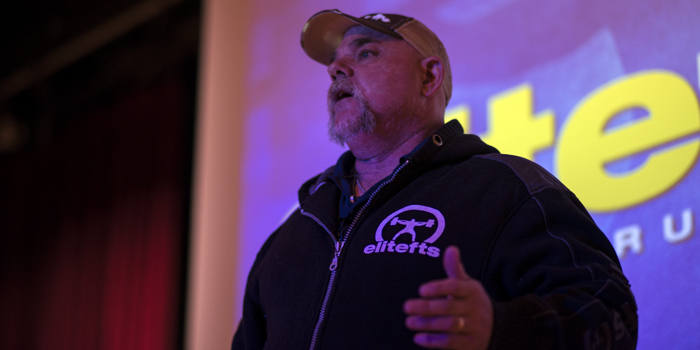
In 2013 Ben Pakulski stopped by the elitefts S4 Compound to train with John Meadows and Dave Tate. He went through multiple grueling training sessions and impressed everyone who witnessed. Since then, Ben's following in the industry has only grown. Last week Ben stopped by again — and this time he and Dave sat down for an on-camera discussion about training and life as an entrepreneur in the fitness industry. In this second episode of the elitefts Strength Plus podcast, Dave Tate and Ben Pakulski talk about the psychological relationship between strength training and business, and the many challenges that relationship presents.
Dave and Ben begin by talking about which psychological aspects of training Dave believes have benefitted him in the world of business. Dave says that the lessons he has learned from training could have come from any strength sport—not just powerlifting—as long as that sport would have been one of his top two priorities in life. He also points out that, while the focus is often on the positive impact strength has on other parts of a person's life, there are also strong negative effects that a strength-sports mentality can have on a business owner.
LISTEN: The State of the Training and Coaching Industry with Dave Tate
For example, when you're in a strength sport, ego is huge because it has to be. That's how you succeed. Once you make it into business, that egocentric mindset doesn't work at all. This is hard to pivot from, Dave says, but it's a necessity. On the positive side, when you're in strength sports, there's a lot of diversity. You're training with and competing against people that come from vastly different lifestyles and backgrounds, but you're all striving for the same goals. Convict or brain surgeon, you want the same thing. The same rule applies to business: you don't have to like the people you work with or the contractors you pay, but if they do the job best, that's who you need. Having the right people in your business can make it tremendously easier to deal with emotional conflict, but Dave says to always be ready to address problems and swiftly cut ties when it's necessary. With limited emotional bandwidth, you have to be selective about where you choose to expend your energy.
Ben then asks Dave about what he believes made him successful in athletics, to which Dave says it was about proving to himself that he could be better than everyone else was saying he was. Like many successful athletes, Dave gravitated toward the sport arena because it was a part of his life that he had total accountability and could be the sole determinant of success or failure. This accountability and responsibility is exactly what Dave believes is most important in raising children, and what he prioritizes with his own children. He points out that parents can only do the best job that they can, and that it's important to understand that adversity is the best teacher — both for you and your children.
In the work force, the constant process of mistake-making is something Dave says is key to developing a successful professional team. Everyone's learning, from the top of the organization to the bottom. So make the mistakes and learn together. Dave says that he runs a culture that, if anything, errs on the side of too much freedom. This is intentional, though, because he wants his people to find a way to enjoy what they're doing most of the time. It's still work and it's going to be tough and really suck some days, but if you can enjoy more than 10% of what you do? That's a good job, and that's what Dave wants for his employees.
To finish the conversation, Ben asks Dave to give advice to the athletes of today who want to be world-class in powerlifting. Dave's answer is that, if lifters today really want to be the best at what they do, they have to commit to it. Commit to the idea of no balance. If you aren't willing to accept everything else falling by the wayside, you aren't ready to be the best. This means you have to focus when you're in the gym. This means you have to focus when you're out of the gym. This means being willing to give it all.
By the minute:
- (0:42) Psychological aspects of training that have helped Dave in business
- (4:34) Dealing with emotional conflict in business
- (7:45) What made Dave successful in athletics?
- (8:49) Instilling integrity and work ethic in children
- (11:25) Establishing values for a professional team
- (15:00) Advice for lifters who want to be world-class









